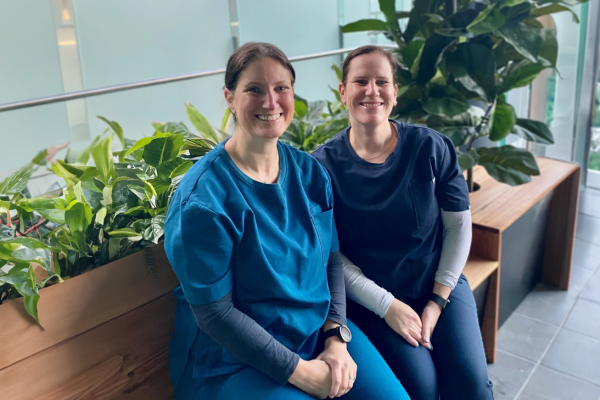About
Seeing the impact: Eye donation program leading the way at Austin Health
- Home
- About
- Latest news
- Seeing the impact: Eye donation program leading the way at Austin Health

1 August 2025
Every year, the gift of sight is made possible thanks to the generosity of donors and their families, and thanks to the dedicated work of staff in our Palliative Care Unit (PCU).
Since launching in 2017, the PCU’s eye donation program has helped restore vision to hundreds of people in need, making Austin Health the leading source of eye tissue donation in Victoria.
Sofia Karageorge and Hayley Hall, Associate Nurse Unit Managers PCU, have played a key role in the program which was initiated after identifying a gap in processes for recognising potential eye donors.
“With more than 600 deaths on the PCU each year, many patients who may have been eligible weren’t being identified, and donation wasn’t being raised,” says Sofia.
“We developed a ward process where every patient is screened for suitability to be an eye donor as part of the admission process.”
If a patient’s goals of care shift to end-of-life, staff check the Australian Organ Donor Register. If a patient meets the criteria, the team refers to the Lions Eye Donation Service and, if accepted, donation is raised with families.
“Our role is to oversee the process, ensuring screening tools are completed, register checks are conducted and donation is offered when appropriate,” Sofia explains.
Sofia says that an important part of her and Hayley’s role is providing support and education to nursing staff.
“Having these conversations is not always easy, and helping staff become more comfortable and confident in raising donation is vital. We aim to empower staff to raise donation sensitively and respectfully, and provide families with information that helps them understand the process so they can make the right decision for their family.”
Eye donation can be a meaningful legacy for families, especially during an incredibly difficult time.
“One of the most common things we hear from families is that donation is ‘something good to come out of an otherwise terrible situation’,” Sofia says.
“Families often describe their loved one as someone who always helped others, and they take comfort and pride knowing that person has given the gift of sight.”
Patients up to 85 years of age may be eligible to donate, and in most cases, a cancer diagnosis is not a barrier. Eye donation can benefit more people than many realise, with whole eye donation potentially helping up to 10 recipients.
“Often families will ask whether the appearance of their loved one will be altered and are surprised to learn that eye donation does not alter appearance and will not affect funeral plans.”
Since the program began, approximately 416 PCU patients have donated eye tissue, enabling over 600 transplants across Victoria, Tasmania and New Zealand.
But Sofia says the first step to making this possible lies with all of us.
“Registering your decision on the Australian Organ Donor Register and, more importantly, discussing your wishes with your loved ones is crucial,” she says.
“Families are the ones who make the final call, and the most common reason for declining donation is, ‘we never discussed it.’ Ensuring you have registered your decision AND discussed this with your family allows the family to provide consent with full confidence knowing they are honouring your wishes.”
Register to be an organ and tissue donor at donatelife.gov.au.


